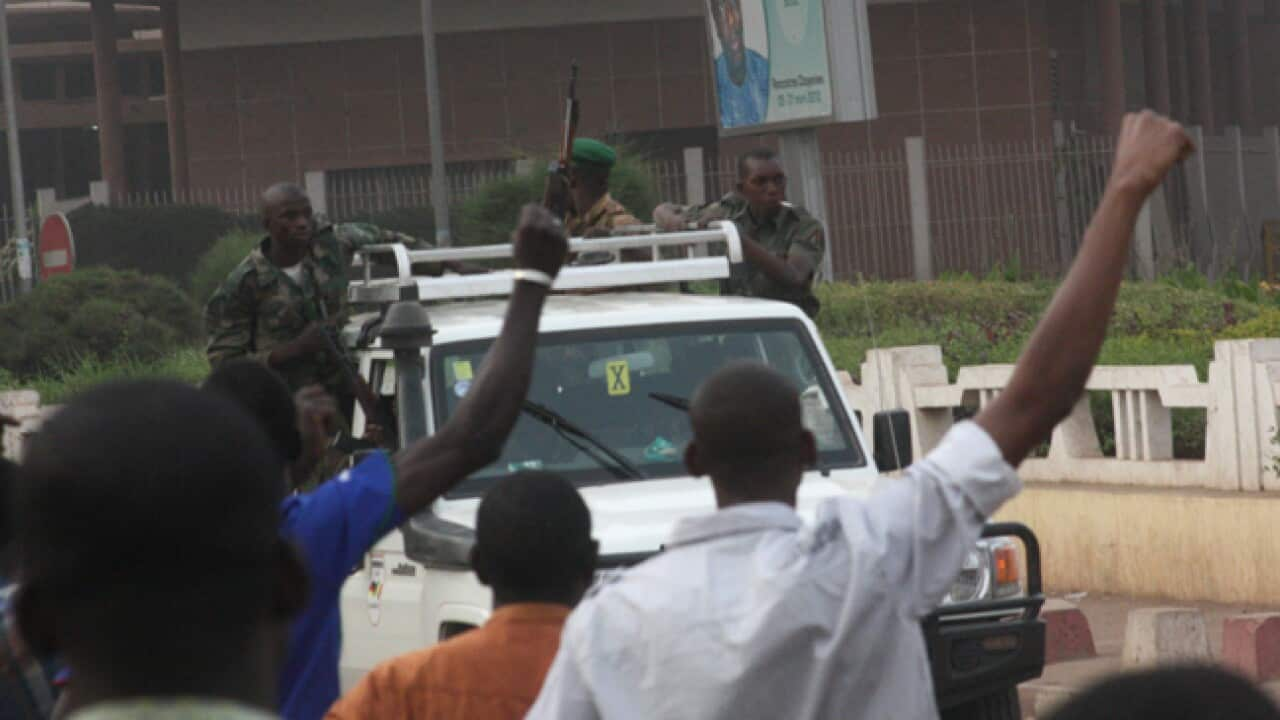Thousands marched on in support of Mali's coup leaders, who sought to quell fears they plan to cling to power by promising democracy and ruling out taking part in elections.
The international community has shunned the regime which took over after a mutiny a week ago turned into a full-blown putsch as soldiers seized government buildings and chased out President Amadou Toumani Toure.
Toure, whose whereabouts have been unknown since he was overthrown on March 22, on Wednesday told AFP he was safe in Bamako and not being held by the junta.
The president was chased out of power just five weeks before the end of his time in office ahead of elections on April 29 which have now been suspended by the junta and no fresh poll date fixed.
"I am indeed in Bamako, and thank God my family and I are doing well. What is important to know, is that I am not being held prisoner," Toure said in a brief telephone conversation.
The mutineers -- who say they rebelled because they are angered by the government's mishandling of a northern Tuareg rebellion -- suspended elections planned for April 29 and have not named a new poll date.
UN human rights chief Navi Pillay urged Mali to follow the lead of neighbouring Senegal, which just wrapped up a peaceful transfer of power, and to hold free, fair and transparent elections.
"Mali also had a good record of democratic elections over the past two decades, and I hope it gets back on that track as soon as possible," said Pillay.
The Economic Community of West African States (ECOWAS) on Tuesday suspended Mali "until its return to constitutional order", following in the footsteps of the African Union.
A delegation of army chiefs arrived in Bamako Wednesday to prepare a venue for a mediation team of six heads of state led by regional strongman Blaise Compaore, president of Burkina Faso, expected to arrive Thursday.
In an interview with French international radio RFI, Burkinabe Foreign Minister Djibril Bassole said ECOWAS leaders were gunning for a transition government which would be lead by parliamentary speaker Dioncounda Traore.
"If this is the formula which can allow an end to the crisis, why not. I think even President Amadou Toumani Toure would agree, he has always sought peace, stability and democracy."
West African leaders have warned that the region's troops were on standby if the junta failed to engage in dialogue.
Mali's rebel soldiers -- from an army poorly-equipped to battle an insurrection by heavily-armed, battle-hardened Tuareg recently returned from Libya -- have called on the desert warriors to join peace talks.
Mali's military has long been on the back foot coming up against Al-Qaeda in the Islamic Maghreb (AQIM) and Tuareg rebels over recent years in the vast desert north, suffering heavy death tolls.
"Running on fumes: Mali's soldiers exposed in the desert," is the title of a US diplomatic cable published in 2009, revealed on Wikileaks, which outlines how 200 soldiers chasing AQIM elements were stranded for a week without gas and supplies.
"Soldiers posted to duty in the desert north are sent to either Gao, Kidal, or Tessalit for three to six month tours without any training to introduce them to fighting - or surviving - in the harsh desert terrain.
These are the northern towns that have come under attack since mid-January in the fresh offensive which has also seen more than 200,000 people flee their homes.
During the last rebellion "some Malian soldiers were placed on duty in the north never even having fired a weapon, due to lack of resources, notably ammunition, during training," read the dispatch.
Simmering discontent over the government's handling of the north -- also torn by drug and arms trafficking and kidnappings of Westerners -- has seen the junta win favour among some Malians.
Several thousand people marched in Bamako brandishing banners reading "Down with ATT (Toure)", "Down with France", and "Down with the international community", while shouting "Sanogo solution" in support of coup leader Captain Amadou Sanogo.
However the country's lawmakers, opposition leaders and politicians have roundly condemned the coup.
The putschists on Tuesday announced a new constitution that rules its members out of upcoming elections, lifted its night-time curfew and reopened the borders in an attempt to show the country was returning to normal.
As the soldiers unveiled few details on how the transition would proceed, the United States again told them they must step back.
"It's not too late to undo this, to allow the country to return to civilian rule," Washington has told Sanogo, according to US State Department spokeswoman Victoria Nuland.
The European Union, the United States and other Western powers have cut off hundreds of millions of dollars of support to Mali -- except for emergency aid to drought-hit regions of the country suffering food shortages.
Toure's situation has been unclear since he was forced to flee when the mutineering soldiers shot their way to his palace, but France said its ambassador Christian Rouyer had made contact with him by phone.
Share

